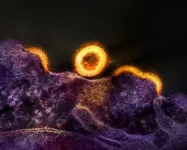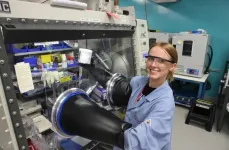(Press-News.org) A treatment that rallies the immune system to destroy cancer raised the survival rate for advanced Hodgkin lymphoma patients to a remarkable 92 percent, suggesting a new standard therapy for the disease. The New England Journal of Medicine published the innovative clinical trial results this week.
Young people are most at risk to get Hodgkin lymphoma, an uncommon blood and immune system cancer that falls within the general category of lymphomas. With this new treatment, scientists believe they found a way to reduce long-term side effects of therapy—including second cancers later in life and heart and lung conditions.
“We will see many less breast cancers 20 to 30 years later in this group of patients, less infertility, less heart disease,” said Wilmot Cancer Institute Director Jonathan Friedberg, MD, MMSc, at the University of Rochester Medical Center, who led the study.
Standard care for Hodgkin lymphoma, which typically involves chemotherapy and often radiation therapy in the youngest patients, already has a cure rate of higher than 80 percent.
“But the 20 percent who are not cured have a long road ahead,” Friedberg said. “The goal of this study was to improve the cure rate while also minimizing side effects and long-term toxicities—and that’s what makes this an unprecedented clinical trial.”
Friedberg is senior investigator and corresponding author for the phase 3 study and chair of the lymphoma committee at the SWOG Cancer Research Network. A large team at SWOG conducted the research as part of the National Cancer Institute (NCI)-funded National Clinical Trials Network.
“This trial is an example of the power of the cooperative group system,” Friedberg said. “It would not have been possible without outstanding collaborations among literally dozens of colleagues across the U.S. and Canada.”
He called out the contributions of first author Alex Herrera, M.D., chief of the division of lymphoma at City of Hope, a large cancer research and treatment center based in Los Angeles; senior biostatistician Michael LeBlanc, PhD, and Hongli Li, MS, both at the Fred Hutch Cancer Center in Seattle; and Kara Kelly, MD, pediatric oncologist at Roswell Park Comprehensive Cancer Center and Sharon Castellino, MD, MSc, pediatric oncologist at Winship Cancer Institute of Emory University, who oversaw accrual to the study through the Children’s Oncology Group, the world’s largest organization devoted to childhood and adolescent cancer research.
Key points from the trial, known as S1826:
Nearly 1,000 patients enrolled in the randomized, phase 3 trial at hundreds of cancer clinics and academic institutions across the U.S. through the SWOG network. The median age of patients with Hodgkin lymphoma in the study is 30.
Half of the patients received the latest standard therapy: chemotherapy and a drug called brentuximab vedotin. The other half also received chemotherapy plus an immunotherapy, nivolumab, which targets a genetic alteration common in Hodgkin lymphoma.
After two years of follow-up, 92 percent of the immunotherapy group had survived and saw no progression of their disease, versus 83 percent in the standard care group.
Researchers designed the study to be highly inclusive. One-third of participants were pediatric patients as young as age 12; about 10 percent were older than 60; and 25 percent were from underrepresented groups.
Historically, pediatric patients with Hodgkin lymphoma often received radiation therapy along with chemotherapy. That treatment, although successful at killing cancer, would often result in significant side effects with life-long implications. In this trial, researchers chose not to not use radiation therapy to minimize those problems and saw fewer side effects and adverse events among the patients who received the immunotherapy.
The trial took an exceptional approach to combine young and older patients into one study, giving them the exact same treatments. Harmonizing treatments across age ranges is now serving as a model for other planned studies for adolescents and young adults with cancer, Friedberg said, and it will allow physicians to rapidly introduce novel cancer treatments into the younger population.
The preliminary trial data was so strong that the NCI ordered the study to halt early to facilitate a faster review by the U.S. Food and Drug Administration. In 2023, the American Society of Clinical Oncology (ASCO) highlighted those results, which at that point had one year of follow-up data. The latest study confirmed the initial findings.
The FDA will determine whether nivolumab should be added as standard treatment for stage 3 or 4 Hodgkin lymphoma. However, because nivolumab is already approved for other indications, Friedberg anticipates that it will quickly become part of treatment guidelines and regular care.
The NCI funded the research. Bristol-Myers Squibb, which produces nivolumab, supported the study in a cooperative agreement with the NCI.
END
In landmark study, immunotherapy boosts survival of advanced Hodgkin lymphoma
Wilmot Director Jonathan Friedberg led the practice-changing research
2024-10-16
ELSE PRESS RELEASES FROM THIS DATE:
Kidney transplantation between donors and recipients with HIV is safe
2024-10-16
WHAT:
Kidney transplantation from deceased donors with HIV (HIV D+) to recipients with HIV (HIV R+) was safe and comparable to kidney transplantation from donors without HIV (HIV D-) in a multicenter observational study in the United States. The clinical outcomes observed were consistent with smaller pilot studies, but this National Institutes of Health (NIH)-funded clinical trial was the first statistically powered to demonstrate noninferiority, which means that an approach being studied is as good as standard clinical practice. The results were published today ...
Brown researchers show how gut hormones control aging in flies and how it relates to human biology
2024-10-16
PROVIDENCE, R.I. [Brown University] — Biologists at Brown University have discovered how a neuropeptide hormone made in the gut of flies can control their lifespan.
The findings, published in PNAS, have implications for humans, too, the researchers say — especially as new diabetes and obesity medications based on gut hormones in the same family of the fly hormone are becoming more widespread.
For the past two decades, study author Marc Tatar, a professor of biology affiliated with the Center on the Biology of Aging at Brown University, has studied how the hormones insulin and insulin-like ...
Which clot-busting drug is tied to better recovery after stroke?
2024-10-16
EMBARGOED FOR RELEASE UNTIL 4 P.M. ET, WEDNESDAY, OCTOBER 16, 2024
MINNEAPOLIS – For people with ischemic stroke, treatment with the clot-busting drug tenecteplase is associated with a slightly higher likelihood of an excellent recovery and reduced disability three months later than the drug alteplase, according to a meta-analysis published in the October 16, 2024, online issue of Neurology®, the medical journal of the American Academy of Neurology. Researchers found that the likelihood of good recovery was similar ...
Study: breast cancer drug shows potential for rare appendix cancer
2024-10-16
Researchers at University of California San Diego School of Medicine found an FDA-approved drug used to treat breast cancer has the potential to be an effective therapeutic for a specific type of appendix cancer.
The clinical trial results, publishing in the October 16, 2024 online edition of the Journal of Clinical Oncology, showed the oral medication, known as palbociclib, stabilized tumor growth and reduced blood tumor marker levels in patients with peritoneal mucinous carcinomatosis (PMC). This form of cancer originates in the appendix and is often resistant to standard chemotherapy.
“Finding that a breast cancer drug is ...
Specific type of DNA could be a target of future cancer therapies
2024-10-16
Research published in Nature Genetics on Oct.14, by Yale Cancer Center researchers at Yale School of Medicine, found a higher concentration of a specific kind of DNA — extrachromosomal or ecDNA — in more aggressive and advanced cancers that could mark them as targets for future therapies.
Using data available from The Cancer Genome Atlas, the International Cancer Genomics Consortium, the Hartwig Medical Foundation, and the Glioma Longitudinal Analysis Consortium, the researchers considered more than 8,000 tumor samples, divided between newly diagnosed untreated tumors and those that had been through previous treatments ...
New Director of the Bates Center for the Study of the History of Nursing
2024-10-16
PHILADELPHIA (October 16, 2024) – J. Margo Brooks Carthon, PhD, RN, FAAN, the Tyson Family Endowed Term Chair for Gerontological Research; Professor of Nursing in the Department of Family and Community Health; and Associate Director of the Center for Health Outcomes and Policy Research, has been appointed the new Director of the Barbara Bates Center for the Study of the History of Nursing (Bates Center), the preeminent history of nursing research center and archive. The Bates Center amplifies the importance of the history of nursing and healthcare to the development of crafting effective health policies and strategies to improve health for all.
“The ...
Scientists developing microchips with brain and lung tissue to study viral neuroinflammation
2024-10-16
Scientists are developing advanced tools to understand and treat neurological symptoms such as brain fog associated with respiratory diseases like influenza. The Biomedical Advanced Research and Development Authority (BARDA), part of the Administration for Strategic Preparedness and Response (ASPR) within the US Department of Health and Human Services (HHS), awarded a three-year contract to researchers at the University of Rochester to develop a technology to model respiratory disease effects on the brain ...
Discover science: Applications open for summer 2025 undergraduate internships
2024-10-16
WASHINGTON, DC – As the nation continues to build a diverse, clean-energy workforce, the Department of Energy (DOE) today announced that applications are being accepted for the Summer 2025 term of two undergraduate internship programs.
The Office of Science Undergraduate Laboratory Internships (SULI) program and the Community College Internships (CCI) program are unique opportunities open to all current and recent college undergraduates. Interns will learn about science and technology careers, team science, networking, and gain the experience needed to transition from internship to employment.
The application deadline for both programs is January 8, 2025, ...
Can electricity treat high blood pressure?
2024-10-16
UNIVERSITY PARK, Pa. — Several medications are available to treat high blood pressure, but more than 10 million Americans do not respond to the treatments, according to the American Heart Association. Using a bioelectronic device to deliver pulsed electricity to the body has proven to be a promising strategy to treat drug-resistant hypertension patients, according to Penn State researcher Tao Zhou, although he noted that its practical application in patient care has significant limitations.
Zhou, assistant professor of engineering science and mechanics and of biomedical engineering, received ...
Microplastics detected in dolphin breath
2024-10-16
U.S. researchers have detected microplastic particles in air exhaled by wild bottlenose dolphins, suggesting that inhalation may be a relevant route of exposure to these potentially harmful contaminants. Miranda Dziobak of the College of Charleston in South Carolina, U.S., and colleagues present these findings in the open-access journal PLOS ONE on October 16, 2024.
Around the world, humans and numerous other animals are exposed to tiny particles of plastic contaminants known as microplastics. In humans and rodents, microplastic exposure has been linked to adverse health impacts, such as oxidative stress and inflammation. Ingestion ...
LAST 30 PRESS RELEASES:
$3 million NIH grant funds national study of Medicare Advantage’s benefit expansion into social supports
Amplified Sciences achieves CAP accreditation for cutting-edge diagnostic lab
Fred Hutch announces 12 recipients of the annual Harold M. Weintraub Graduate Student Award
Native forest litter helps rebuild soil life in post-mining landscapes
Mountain soils in arid regions may emit more greenhouse gas as climate shifts, new study finds
Pairing biochar with other soil amendments could unlock stronger gains in soil health
Why do we get a skip in our step when we’re happy? Thank dopamine
UC Irvine scientists uncover cellular mechanism behind muscle repair
Platform to map living brain noninvasively takes next big step
Stress-testing the Cascadia Subduction Zone reveals variability that could impact how earthquakes spread
We may be underestimating the true carbon cost of northern wildfires
Blood test predicts which bladder cancer patients may safely skip surgery
Kennesaw State's Vijay Anand honored as National Academy of Inventors Senior Member
Recovery from whaling reveals the role of age in Humpback reproduction
Can the canny tick help prevent disease like MS and cancer?
Newcomer children show lower rates of emergency department use for non‑urgent conditions, study finds
Cognitive and neuropsychiatric function in former American football players
From trash to climate tech: rubber gloves find new life as carbon capturers materials
A step towards needed treatments for hantaviruses in new molecular map
Boys are more motivated, while girls are more compassionate?
Study identifies opposing roles for IL6 and IL6R in long-term mortality
AI accurately spots medical disorder from privacy-conscious hand images
Transient Pauli blocking for broadband ultrafast optical switching
Political polarization can spur CO2 emissions, stymie climate action
Researchers develop new strategy for improving inverted perovskite solar cells
Yes! The role of YAP and CTGF as potential therapeutic targets for preventing severe liver disease
Pancreatic cancer may begin hiding from the immune system earlier than we thought
Robotic wing inspired by nature delivers leap in underwater stability
A clinical reveals that aniridia causes a progressive loss of corneal sensitivity
Fossil amber reveals the secret lives of Cretaceous ants
[Press-News.org] In landmark study, immunotherapy boosts survival of advanced Hodgkin lymphomaWilmot Director Jonathan Friedberg led the practice-changing research







